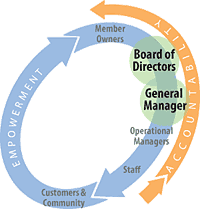
At this juncture in our series examining the empowerment and accountability stream in food co-ops, we understand that at all points along the way co-op stakeholders need systems that allow for the clear flow of delegation and responsibility. However, it can be argued that the dynamism of the empowerment stream often hinges on the handoff of power from the board to the general manager, and the general manager’s ability to be accountable to the co-op’s mission.
Historically, this had been a weak link for food co-ops. There are a number of reasons for this. For co-ops founded in the 1970s, people were distrustful of authority and feared the abuse of power. Hierarchical decision-making was considered suspect and accountability was deficient as a result. The lack of effective systems left some co-op boards and managers with a legacy of inadequate tools, leading to stagnation or mistrust.
Overcoming the Weakness
A lot of these past weaknesses have largely been overcome in our sector. The culture within food co-ops has changed radically in its perceptions about systems and structure, yet boards still face unique challenges in turnover and experience levels that affect how governance and management interface. As food co-ops look to improve performance, many are now putting efforts toward reinforcing the co-op values behind the empowerment and accountability stream, and reviving a mutual passion for cooperation in local communities.
Mutual respect, backed by a strong decision-making infrastructure, is critical at this point in the empowerment stream. Thane Joyal, board trainer and consultant, finds these things imperative in the board-general manager empowerment and accountability stream. “There are two key relationships foundational to the co-op: the relationship among directors within the board including their agreements with each other, and the relationship of the board as a whole with the general manager,” Joyal said. The ability to empower can be hampered when the collective authority is not channeled by adequate systems, and accountability is meaningless if boards just rubber-stamp monitoring reports. Disrespect creeps in when these relationships are not managed well. When the co-op builds systems that support the value and unique perspectives both parties bring to the table, the co-op will have a successfully empowered general manager and a board that is leading the co-op on behalf of member-owners.
Board leadership development consultant Art Sherwood said that it’s important that the board is setting guidelines in ways that enable successful empowerment and accountability. “It’s important that boards are effective at empowering their general managers. Those that are successful take the approach that it’s important to set their general managers up for success,” he said. Sherwood explained that if a board is not intentionally using empowering language in their policies, they could be creating guidelines for conduct, or executive limitations, which are unnecessarily constraining in terms of accomplishing the co-op’s goals.
Sherwood points out that while board policies often do provide adequate direction, the board-general manager power relationship also doesn’t occur in a vacuum. “Boards need to ask—are we really empowering or controlling? Does the board follow its own rules regarding this relationship in terms of tone and intention?”
Those questions are imperative. According to Sherwood, both sharing power and being held accountable is a very positive thing. It helps you think about the work you are doing and reflect upon it. “The bottom line is that the board is responsible for holding the general manager accountable for results and conduct. That’s the basics, and we’re already doing this. But there’s a next evolution to empowerment and accountability, and that is about how we can improve and continually move forward. This can be a very constructive part of the co-op’s development,” he said. The next progression is for boards and managers to work more in partnership, to be on the same side in moving the co-op in the direction that meets owner values.
Co-op Purpose Is Critical
In order to foster that dynamic, board leadership consultant Michael Healy thinks that the big questions about the co-op’s purpose needs to be addressed by both the board and manager. He also argues that most directors and general managers are attracted to their jobs because they want to be of service to their communities and to have an impact on something larger than themselves. Harnessing that intention and creating the vision together is ultimately what a functioning empowerment and accountability stream can do for all the co-op’s stakeholders.
“If the empowered person sees him or herself as doing their work on behalf of service to the organization, it’s about more than just being told what to do,” said Healy. “If you look at the general managers who are excellent at their jobs and the boards that love what they are doing, you will also see people who realize that their goal is to be accountable to the members as a whole.”
Healy also encourages boards and managers to think about this in practical terms, to use resources available to them through CBLDLibrary. “It’s one thing to talk about all this theoretically, but you need specific tools to turn theory into reality,” he said. “Many boards have grappled with issues of empowerment and accountability over the years. We are learning from all their efforts how to do this effectively.”
Sherwood said the long-term value of focusing on this process is to create institutional memory and a sense of common purpose. A business that operates with the values of transparency front and center can be a model for what good civic engagement looks like. “Our co-ops are different from conventional businesses. It’s important that we get good at this process because this is how we will assure our long-term success.”
Have more questions?
Get in touch with one of our consultants.
